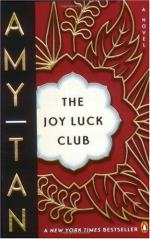|
This section contains 3,200 words (approx. 11 pages at 300 words per page) |

|
SOURCE: “Genes, Generation, and Geospiritual (Be)longings,” in Imagining the Nation: Asian American Literature and Cultural Consent, Stanford University Press, 1998, pp. 111–17.
In the following essay, Li discusses the emphasis in Tan's works, including The Joy Luck Club, on female familial relationships.
Tripmaster Monkey and Jasmine's narrative claiming of America is almost entirely overshadowed by the meteoric success of Amy Tan's Joy Luck Club (1989).1 A book about mother-daughter relationships and cultural displacement and recuperation, The Joy Luck Club harks back to the familial rifts and reconciliations of The Woman Warrior and departs from Kingston and Mukherjee's preoccupation with Asian American integration. If her fellow writers choose to substantiate the individual in terms of the national, situating their protagonists in the reimagined community of the United States, Tan manages to limit the trials and tribulations of her characters to the genealogical family, apparently independent from the larger society.
The...
|
This section contains 3,200 words (approx. 11 pages at 300 words per page) |

|


